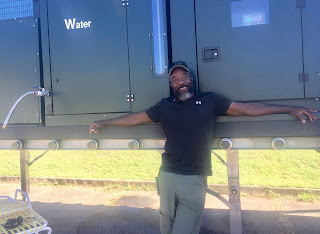 |
| Love All Beings instead of Meat? |
Up until that point it didn't seem consequential enough to consider veganism. Besides, my taste buds would probably rebel like a child not getting enough sugar. The world's problems were clearly so much bigger than my personal eating habits. Passing the buck and burying my head in the sand had been working for this long, why change now?
As long as I was trying to do the organic, free-range, 'humanely slaughtered' thing, I felt cleared from further consideration of my food choices. Shouldn't we all be focusing on more important issues like racism, women's rights, domestic violence, child trafficking, deforestation, clean water access, protecting endangered species, climate change, and all the rest? Saying no to animal agriculture was not high on my priority list. Plus, like most everyone else I knew, I envisioned myself as not consuming that many animal products. The rationale of 'not that much' is a strategic phrase, helping us to feel unaffliliated with even our own choices.
Most restaurants and family dinners are supporters (knowingly and unknowingly) of CAFOs (Confined Animal Feeding Operations). Even though I am against the cruel and mechanistic treatment of animals, I didn't feel like I could do anything about it. Except maybe go to the Birchwood Cafe, where the animals live happily before their demise. So called sustainably harvested animals were much more expensive, but if I didn't consume 'that much,' it seemed like the way to go. Unless of course you were to question the ethics of killing any animal (happy or not), or the actual unsustainability of the grass-fed fantasy. Either way, the number of 'happy' animals it would take to feed us all, does not compute. The rainforests are already being destroyed for our outdated eating habits. It's easy to see that there isn't enough land in the world to support the animals that feed the humans.
 |
| Compassion Begins On Your Plate. |
Now that I've quit making excuses for my long lingering denial, I've gained a new capacity for thought. My worldview has changed, raising even more radical questions. I wonder about the physical, emotional and energetic consequences of ingesting suffering and violence? I wonder what would happen if children and adults were taught to truly respect animals? I wonder why it's considered normal to torture others? Has society as a whole become addicts of the meat and dairy industry? Why do humans feel superior to other beings? Why do some humans feel superior to other humans? What about those who refer to women as 'pieces of meat,' does that have anything to do with the rates in which women are hunted, raped and killed? What would it be like to live in a world where people did not presume power over others? Why do we need advertisements reminding us to continue harming animals for food? There was only one answer I had to all of those questions. I could step outside of my conditioning and stop supporting the madness.
The lifestyle practices of yoga & meditation are based on compassion. The ethical guidelines of yoga include ahimsa (non-violence), satya (truth), asteya (non-stealing), aparigraha (non-greed) and brahmacharya (non-excess). It's often said that if you can only focus on one, practice ahimsa (non-violence). All the rest will fall into place. May we all find the courage to digest the truth about animal agriculture and help to create a more consciously connected world. We are not free until others are free. That's the real deal. It is the deepest meditation that all beings should be free from suffering and the causes of suffering. While we're hopefully all busy taking down the framework that produced the patriarchy and white supremacy, how about we dismantle speciesism while we're at it? Many injustices can be true all at once, and there is no doubt that they are all connected.
"As long as there are slaughterhouses there will be battlefields." -Leo Tolstoy









